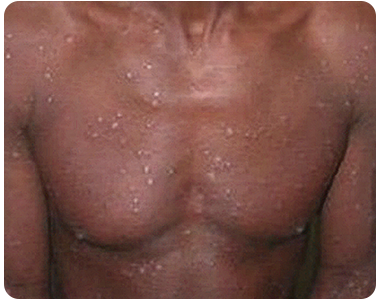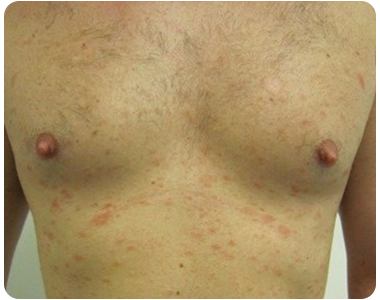SYPHILIS IS SPREADING.
Syphilis is a sexually transmitted disease (STD) caused by the bacteria Treponema pallidum. New syphilis infections are at record highs in King County. Gay, bi, and other men who have sex with men make up the majority of cases. Syphilis has also dramatically increased among straight men and women causing syphilis infections to rise among newborns. Currently, reported syphilis cases are low (less than 1%) among transgender and non-binary people.
More Facts – Public Health-Seattle & King County
GET TESTED. GET CURED.
WHAT ARE THE SYMPTOMS?
Symptoms of syphilis can be easy to miss or mistake for something else. Even if you don’t notice symptoms, or if the symptoms go away on their own, you can still have syphilis. Regular STD testing can help catch syphilis before it gets too serious.
Different stages, different symptoms. Syphilis goes through four stages if left untreated, each with its own set of symptoms. These symptoms are easy to miss and go away on their own even without treatment. Regular testing for STDs can help catch syphilis early. However, it’s important to be aware of what each stage looks like so you can seek treatment.
Primary Syphilis
The first stage is called primary syphilis. It occurs 10-90 days after infection. In this stage people develop a painless sore (called a chancre) where the bacteria that causes syphilis enters the skin. This could be on the mouth, lips, tongue, penis, anus, rectum, and vulva or vagina. The sore goes away on its own without treatment. As a result, many people don’t notice this stage. But don’t ignore the sore! Even if it goes away, syphilis is still in your body. Be sure to get treated as soon as you notice it!
Secondary Syphilis
The second stage is called secondary syphilis. It occurs several weeks after infection, while the primary syphilis sore is still healing. In this stage people can get a reddish-brown, spotted rash on the palms of the hands or bottoms of the feet. Additionally, the rash can appear on the chest, stomach, back, arms, and legs. People with secondary syphilis may also develop white spots in their mouths, patchy bald spots, and/or fleshy bumps that occur in the skin folds. Some people have flu-like symptoms like fever, fatigue, aches, and swollen glands. Even without treatment, secondary syphilis will also resolve on its own.
Latent Syphilis
No symptoms: After secondary syphilis, the infection enters the latent stage where there are no symptoms. Although there are no symptoms, you will remain infected if you don’t get cured.
Tertiary (Late) Syphilis
Finally, after two to three decades, syphilis enters the tertiary stage. Most people do not experience tertiary syphilis. If it does occur, it will severely affect organ function. It is important to know that syphilis can also affect the eyes, ears, and brain at any stage, especially early syphilis.
GET TESTED.
If you’re sexually active, make syphilis testing part of your routine just like testing for HIV and other STDs.
Where can I get tested?
Get tested if you think you might have syphilis. Visit your doctor or one of the HIV/STD community-testing locations listed below. Cost varies.
King County
| Testing Site Links | HIV | STD |
|---|---|---|
| Center for Multicultural Health |
✔ |
|
| Entre Hermanos |
✔ |
✔ |
| Gay City: Seattle’s LGBTQ Center |
✔ |
✔ |
| Lifelong |
✔ |
✔ |
| Out of the Closet |
✔ |
|
| Planned Parenthood |
✔ |
✔ |
| POCAAN |
✔ |
✔ |
| Public Health – Seattle & King County Sexual Health Clinic at Harborview |
✔ |
✔ |
| UTOPIA |
✔ |
✔ |
GET CURED.
There is a cure for syphilis! The sooner you get tested, the easier it is to cure. Delaying treatment can result in serious health conditions. So, get tested and treated right away if you think you might have syphilis.
If you have syphilis, avoid having sex until you are cured. Tell your sex partners so they can also get tested and cured. Do not have sex with a partner who has syphilis until they are cured.
Can I get syphilis again after I’ve been cured?
Yes. Having syphilis once does not protect you from getting it again. If your partners have not been cured, they can re-infect you.
































